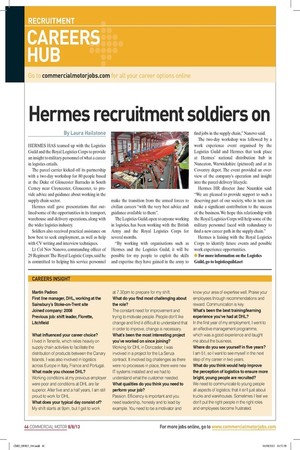CAREERS INSIGHT
Page 39

If you've noticed an error in this article please click here to report it so we can fix it.
Martin Padron First line manager, DHL, working at the Sainsbury's Stoke-on-Trent site Joined company: 2008 Previous job: shift leader, Florette, Litchfield
What influenced your career choice? I lived in Tenerife, which relies heavily on supply chain activities to facilitate the distribution of products between the Canary Islands. I was also involved in logistics across Europe in Italy, France and Portugal. What made you choose DHL?
Working conditions at my previous employer were poor and conditions at DHL are far superior. After five and a half years, I am still proud to work for DHL. What does your typical day consist of? My shift starts at 9pm, but I get to work
at 7.30pm to prepare for my shift.
What do you find most challenging about the role?
The constant need for improvement and trying to motivate people. People don't like change and find it difficult to understand that in order to improve, change is necessary. What's been the most interesting project you've worked on since joining? Working for DHL in Doncaster, I was involved in a project for the La Senza contract. It involved big challenges as there were no processes in place, there were new IT systems installed and we had to understand what the customer needed. What qualities do you think you need to perform your job? Passion. Efficiency is important and you need leadership, honesty and to lead by example. You need to be a motivator and
know your area of expertise well. Praise your employees through recommendations and reward. Communication is key.
What's been the best training/learning experience you've had at DHL?
In the first year of my employment, I went to an effective management programme, which was a good experience and taught me about the business.
Where do you see yourself in five years? I am 51, so I want to see myself in the next step of my career in two years.
What do you think would help improve the perception of logistics to ensure more bright, young people are recruited? We need to communicate to young people all aspects of logistics; that it isn't just about trucks and warehouses. Sometimes I feel we don't put the right people in the right roles and employees become frustrated.









































